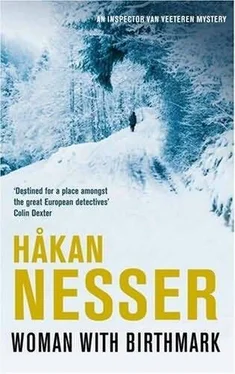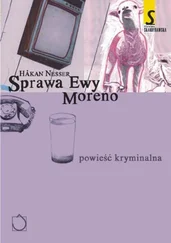
Håkan Nesser
Woman with Birthmark
A book in the Inspector Van Veeteren series, 2009
Translated from Swedish by Laurie Thompson © 2009
And then, of course, there is a certain type of action that we can never leave behind us, nor buy ourselves free from. Perhaps we can't even beg forgiveness for such deeds.
W Klimke, therapist
December 23-
January 14
She felt cold.
The day had started with a promising light snowfall, but as lunchtime approached, the strong wind blowing off the sea had turned the precipitation into diagonal, driving rain of the very worst kind. It chilled you to the bone, forced the stall owners down by the harbor to shut up shop hours earlier than usual, and in Zimmermann's bar they were serving about three times as many hot toddies as on a normal December day.
To make matters worse, the cemetery was facing southwest, on a gently sloping, treeless hillside, totally exposed to every kind of weather and wind. When the little group finally reached the newly dug, muddy grave, a thought struck her.
At least it was sheltered down there. At least you didn't have to take the wind and this damned rain into the grave with you. Every cloud has its silver lining.
The clergyman snuffled, and his accomplice-or whatever you should call him-struggled with the umbrella. Tried to make it cover both the man in black and himself, but the gusts were capricious and the correct angle shifted from second to second. The bearers dug their heels into the soaking wet soil and started to lower the coffin. Her bouquet on the lid already looked a mess. Like a dollop of vegetables that had boiled for too long. One of the bearers slipped but managed to regain his balance. The clergyman blew his nose and started to read the liturgy. His accomplice fumbled with the spade. The rain grew even worse.
It was typical. She couldn't help acknowledging that as she clenched her fists in the pockets of her overcoat and stamped on the ground in an attempt to warm up her feet.
Absolutely goddamned typical. A ceremony just as shambolic and undignified as the rest of the dead woman's life had been. So she couldn't even be granted a decent burial. The day before Christmas Eve. A patch of blue sky or the light snowfall lasting into the afternoon-would that have been too much to ask? Would that have been too much trouble?
Of course it would. Her mother's life had been littered with defeats and messy failures; to be honest, all this was both fitting and expected, and she felt herself having to bite her lip so as not to burst out crying.
A totally consistent and logical conclusion, then. In the same key all the way through. And no crying. Not yet, in any case.
For some inscrutable reason her mother had urged just that. Don't cry. Whatever you do, don't stand there bawling at my funeral. Tears have never been any use in any circumstances, believe you me. I've sobbed bucketfuls in my lifetime. No, do something, my girl! Take action! Do something magnificent that I can applaud up there in heaven!
She had squeezed her daughter's hand with both her own chafed, weak ones as she said that. Fixed her with her dying eyes, and it had been clear that for once, this was serious. For once, her mother was begging her to do something; it was a bit late and the wording was hardly crystal clear, but there could be no doubt about what she meant. Or could there?
Half an hour later she was dead.
Do something, my girl. Take action!
The clergyman fell silent. Looked at her from under the dripping umbrella, and she realized that he was expecting her to do something as well. What? It wasn't easy to tell. It was only the second time in her life that she had attended a funeral; the first time, she had been eight or nine years old, and she was there for her mother's sake on that occasion as well. She took several cautious steps forward. Stopped a safe distance short of the grave to avoid the farce of slipping and joining her mother down below. Bowed her head and closed her eyes. Clasped her hands in front of her.
I expect the bastards think I'm standing here praying, she thought. Or at least, they're pretending to. Goodbye, Mom! You can rely on me. I know what I have to do. You'll be able to warm the palms of your hands up there with the angels.
And so it was all over. The clergyman and his accomplice each held out a cold, damp hand to shake hers, and ten minutes later she was standing under the leaking roof of a bus shelter, longing for a hot bath and a glass of red wine.
Or a brandy. Or both.
One mourner, she thought. At my mother's interment there was only a single mourner. Me. So that was that.
But I sincerely hope that several more will be mourning soon.
That was quite nicely put, and as she stood there fighting against the cold and the damp and her desire to cry, it was as if those words had lit a small flame inside her. Set fire to something combustible at last, something that slowly began to heat up all the old frozen and stiff lumber lying around in her soul.
A conflagration, no less, that soon enough would spread, consuming others in its flames… making them fear this sea of anger that in due course would surround and destroy them all!
She smiled at that thought as well. Something she had read, presumably; or perhaps it really was true what one of her very first lovers had maintained. That she had a gift. A sort of aptitude for poetry and putting things into words.
For the truth, and passion. Or suffering, perhaps. Yes, that was more like it. She had suffered all right. Not as much as her mother, of course, but she had endured her due share. And more.
I'm freezing cold, she thought. Come on, you fucking bus!
But there was no sign of the bus. No sign of anything, and it dawned on her as she stood stamping her feet in the gathering dusk in the leaky shelter that this was exactly what her whole life had been like. This was the ideal image for what it was all about.
Standing waiting for something that never came. A bus. A good man. A proper job.
A chance. Just one damned chance to make something sensible of her life.
Standing waiting in the darkness and wind and rain. And now it was too late.
She was twenty-nine years of age, and it was too late already.
My mother and I, she thought. One mourning at the side of the grave. The other lying in it. We might just as well have changed places. Or lain down beside each other. Nobody would have minded. If it weren't for…
And she felt the flame set fire to her resolve once more, and everything inside her welled up and filled her with warmth. A strong, almost tangible warmth, which caused her to smile in the midst of her grief and clench her fists even harder deep down in her overcoat pockets.
She took one final look at the long bend but there was no trace of a headlight. So she turned her back on it all and started walking toward the town.
Christmas came and went.
New Year's came and went. Rain shower followed rain shower, and the blue-gray days passed in a state of monotonous indifference. Her doctor's certificate ran out, and she had to sign on for unemployment benefits. There was no noticeable difference. Off work from what? Unemployed from what?
Her telephone had been cut off. When she received the warning in October, she had purposely failed to pay the bill, and now the company had taken action. The wheels had turned.
It was pleasant. Not only did she not have to meet people, she avoided having to listen to them as well. Not that there would have been all that many for her to put up with. There was no denying that her circle of acquaintances had shrunk recently. During the first fourteen days after the funeral she spoke to a grand total of two persons. Heinzi and Gergils; she had met both of them by accident in the square, and within thirty seconds they had both tried to cadge something off her. Heroin or a bit of hash, or a bottle of wine, at least-for fuck's sake, surely she had something to give to an old mate? A shower, then, and a quick screw, perhaps?
Читать дальше













